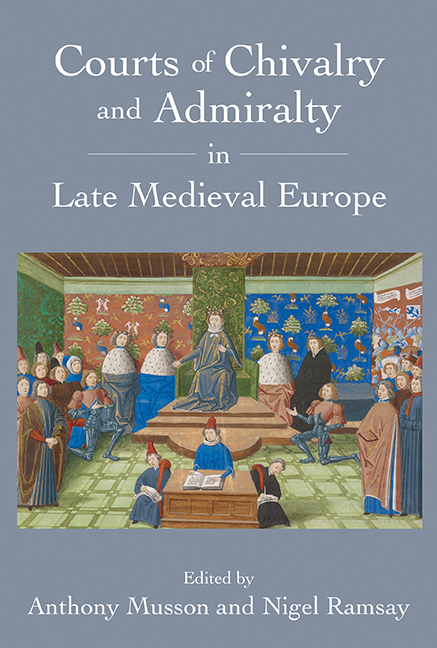Book contents
- Frontmatter
- Contents
- List of Illustrations
- Notes on Contributors
- Preface
- A Note on Editorial Practice
- List of Abbreviations
- Introduction
- Chapter 1 Heralds and the Court of Chivalry: From Collective Memory to Formal Institutions
- Chapter 2 French Armorial Disputes and Controls
- Chapter 3 Art, Objects and Ideas in the Records of the Medieval Court of Chivalry
- Chapter 4 Sir Robert Grosvenor and the Scrope–Grosvenor Controversy
- Chapter 5 From Brittany to the Black Sea: Nicholas Sabraham and English Military Experience in the Fourteenth Century
- Chapter 6 ‘Armed and redy to come to the felde’: Arming for the Judicial Duel in Fifteenth-Century England
- Chapter 7 The Jurisdiction of the Constable and Marshals of France in the Later Middle Ages
- Chapter 8 The Origins and Jurisdiction of the English Court of Admiralty in the Fourteenth Century
- Chapter 9 The Consulate of the Sea and its Fortunes in Late Medieval Mediterranean Countries
- Chapter 10 The Admiralty and Constableship of England in the Later Fifteenth Century: The Operation and Development of these Offices, 1462–85, under Richard, Duke of Gloucester and King of England
- Chapter 11 Some Dubious Beliefs about Medieval Prize Law
- index
Chapter 11 - Some Dubious Beliefs about Medieval Prize Law
Published online by Cambridge University Press: 28 June 2018
- Frontmatter
- Contents
- List of Illustrations
- Notes on Contributors
- Preface
- A Note on Editorial Practice
- List of Abbreviations
- Introduction
- Chapter 1 Heralds and the Court of Chivalry: From Collective Memory to Formal Institutions
- Chapter 2 French Armorial Disputes and Controls
- Chapter 3 Art, Objects and Ideas in the Records of the Medieval Court of Chivalry
- Chapter 4 Sir Robert Grosvenor and the Scrope–Grosvenor Controversy
- Chapter 5 From Brittany to the Black Sea: Nicholas Sabraham and English Military Experience in the Fourteenth Century
- Chapter 6 ‘Armed and redy to come to the felde’: Arming for the Judicial Duel in Fifteenth-Century England
- Chapter 7 The Jurisdiction of the Constable and Marshals of France in the Later Middle Ages
- Chapter 8 The Origins and Jurisdiction of the English Court of Admiralty in the Fourteenth Century
- Chapter 9 The Consulate of the Sea and its Fortunes in Late Medieval Mediterranean Countries
- Chapter 10 The Admiralty and Constableship of England in the Later Fifteenth Century: The Operation and Development of these Offices, 1462–85, under Richard, Duke of Gloucester and King of England
- Chapter 11 Some Dubious Beliefs about Medieval Prize Law
- index
Summary
For fifty years now, historians have had at their disposal a coherent account of the law of arms applicable in the Court of the Constable and Marshal to cases concerned with the dividing of spoils and the ransoming of prisoners taken in wars.1 Disputes over these matters were resolved by reference to any contracts formed between the parties involved, failing which to any regulations issued in relation to the particular conflicts in which they fought, failing which to more general regulations or the customs of warfare. At the more general level especially, the law of arms had an international flavour, for the regulations introduced in one place were often influenced by those already in force elsewhere, and the communities that considered themselves obliged to conform to customary usages were not always nationally defined. It was of course important for the decisions delivered in the courts of one place to appear acceptable in the other places from which those despoiled or imprisoned came, and it was partly to this end that the practice of military tribunals was rationalised in terms of the legal theory expounded in broadly similar terms in universities throughout Europe. The learned doctrine of the law schools provided a framework of legitimacy within which courts in different parts of Europe were able to fashion versions of the law of arms that could be expected to receive recognition elsewhere. It follows that to understand the law of arms properly required – and still requires – familiarity with academic theory as well as forensic practice.5 It was not without cause that advice was taken on the application of the law of arms from ‘doctors of law’ or ‘iurisperiti’, a cadre of experts in the civil and canon laws whose advice was relied on in the specialised courts of the Constable and Marshal, the Admiral, and certain other officials.
- Type
- Chapter
- Information
- Courts of Chivalry and Admiralty in Late Medieval Europe , pp. 223 - 244Publisher: Boydell & BrewerPrint publication year: 2018

